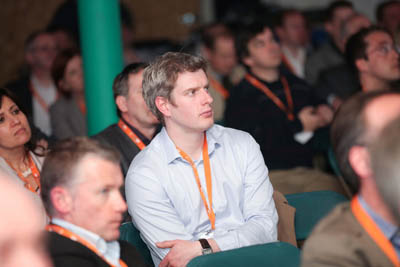Eoghan Jennings at Startupbootcamp's Investor Day last Wednesday in Dublin. At the event, 10 start-ups pitched for investment to 100 assembled business angels and venture capitalists. Image by Conor McCabe
Next year’s Startupbootcamp is set to zero in on well-being and health start-ups. That’s according to co-founder Eoghan Jennings, who said the start-up accelerator is to partner with leading pharma companies in Ireland.
Jennings, who is also managing director of Parklane Capital, said Startupbootcamp in Dublin is in talks with “leading pharma companies” in Ireland.
“We’ve received funding commitments,” he said.
Just last week, the 10 start-ups that engaged in the first-ever Startupbootcamp in Dublin pitched their technologies to 100 investors and venture capitalists.
Think Silicon Valley Bank, Earlybird Venture Capital from Germany, plus the likes of Draper Fisher Jurvetson and Amadeus Capital Partners, known for having invested in the Belfast telecoms software player Aepona.
Of the 10 start-ups, six came from outside of Ireland.
“We’re one of the first test cases for bringing non-EU citizens here to Ireland and getting them temporary visas so they can work on their start-ups,” said Jennings.
He explained how the first accelerator in Dublin focused on IBM’s Smarter Planet drive.
“The focus was on real-world problems, and coming up with technological solutions, start-ups that could offer real, tangible value. That was the journey we took this year.”
For instance, Gustavo Monteiro and Felipe Gabardo are behind the Brazilian start-up Opara, one of the start-ups in this year’s Startupbootcamp. The duo came up with an online platform to manage and trace perishable products in their lifecycle, from the farm to the supermarket shelf.
Ireland’s pharma expertise
So why is well-being and health going to be the focus for next year’s Startupbootcamp?
Jennings said it’s down to the depth of pharma expertise that Ireland has to offer right now.
“If you think of all of the pharma companies that are in Ireland, over the years such companies have spawned a wealth of talent and a pool of executives in the well-being and health industry here who can mentor and share their expertise,” he explains.
“What we want to do is leverage from that talent base and help start-ups to create technologies applied to well-being and health.”

Business angels and VCs at Startupbootcamp’s Investor Day last week
And while apps and gaming are all of the rage now, Jennings said Startupbootcamp sees that such med-tech start-ups will be back in vogue in the next few years.
“Investors think they will be a quick win, especially around patient compliance.”
He pointed to the Austrian start-up Mysugr, as a case in point. The start-up, which is based in Vienna, has come up with an iPhone app for people with diabetes. One of the aims of their app is for people with diabetes to track their sugar levels, and to input and store this data on their phones.
And as for Startupbootcamp, Jennings said next year’s batch of 10 start-ups will continue to get micro investment of €12,000, as well as co-working space for three months at The Factory, a converted warehouse based on Barrow Street in Dublin City.
And, in return, the programme will take an 8pc equity stake in each of the start-ups.